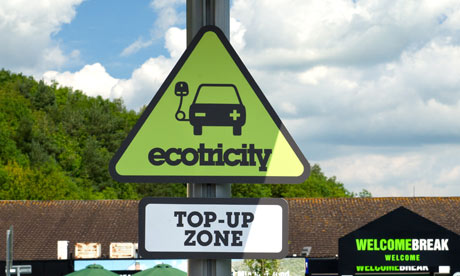Today we launched the world's first national charging network for electric cars. That may sound a bit grand, for something quite wonderfully simple - a series of charging posts installed by Ecotricity at motorway services up and down the country. Charging stations, for electric cars, that are easy to access and free to use. Enabling Britain's electric car drivers to drive the length and breadth of the country, with all the convenience of simply pulling into a motorway service station to top up.
Why are we building this? There are after all only some 2,000 electric cars on the road today. In fact that's a big part of the reason – a lack of demand.
It's often said that one of the reasons more people don't buy electric cars is because of a lack of charging facilities – while the reason more charging facilities aren't built is said to be because not enough people are buying electric cars – classic chicken and egg stuff. We're hoping to break that impasse.
Another barrier to take-up is "range anxiety" – the fear of running out of juice when travelling any kind of serious distance.
So this is where our network comes in - we're hoping it'll help kickstart Britain's electric car revolution.
We chose the motorway network for good reason. The big focus to date, with charging posts, has been town and city centres – I think this is actually where they are needed the least. Car use statistics point to this.
The average car in Britain travels around 20 miles a day, a distance that most modern electric cars can sustain for almost a week without needing to charge. And most car owners have access to off-street parking (70% apparently) – and therefore are able to charge at home, at night. Most cars won't need to charge, most days. It's the longer journeys where charging is needed most.
We've chosen where the power for this network comes from carefully too. Our points will be wind-powered – and in doing this we're making a serious point. Britain needs to switch to electric cars as fast as we possibly can – but that alone is not enough. Where the electricity comes from is vitally important. Electric cars need to be running on renewable energy sources, the power of the wind and the sun – only then does their full zero-emission driving potential become realised.
And can we do that as a nation? Can all of us drive wind-powered electric cars? The statistics say yes.
There are around 28m cars on the roads of Britain, driving 150bn miles a year, burning around 20m tonnes of oil and producing 70m tonnes of CO2 (12% of our total emissions). Incredible numbers – but we could power all of that with just 10,000 of today's wind turbines and 5,000 of tomorrow's (they double in size every few years).
Can the grid take it? It would require an increase in electricity delivered through the grid of about 12%, far less than most people think. And for context, prior to the credit crunch, grid-delivered electricity grew by around 3% a year (so we're talking just four years' normal growth to power all the UK's cars). And most charging will take place at night, at times of low demand. The grid can easily cope, in fact if Britain switched to electric vehicles the grid would operate more efficiently.
And consider this. One of the truly revolutionary aspects of electric cars is that we can all be our own oil companies – we can make our own electricity – and power our own cars. A typical five kilowatt rooftop solar system, for example, could provide some 5,000 miles of driving a year – pollution (and fuel duty) free.
Given this, perhaps in due course, the "anxiety" around electric cars will pass from motorists to the oil companies.

